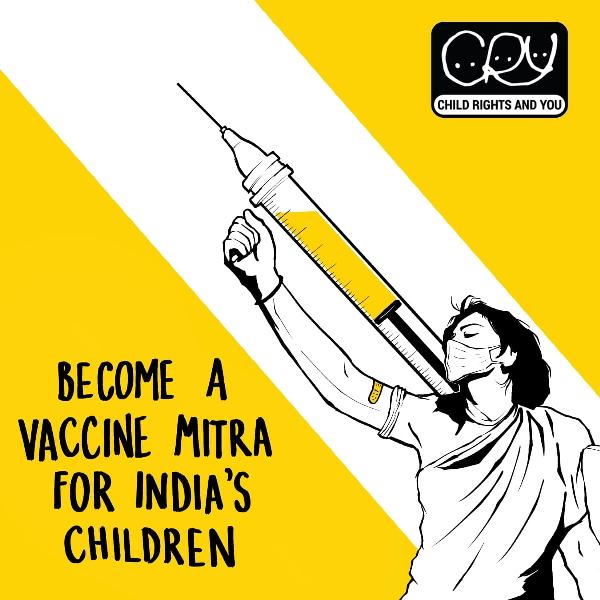 COVID-19 and Children
COVID-19 and Children Stakeholders focus on child-centric plans to meet challenges of the imminent pandemic third wave
Kolkata/IBNS: According to health experts, the impending third wave of the COVID-19 pandemic is likely to be a bigger threat to children.
Therefore, by way of preparedness to meet the challenges, a few concerned bodies recently organized a national level workshop titled ‘COVID-19 and Children: A Rural Perspective’.
The workshop was organized by the Child Centric Disaster Risk Reduction (CCDRR) Centre, National Institute of Disaster Management (NIDM), Union Ministry of Home Affairs in collaboration with CRY – Child Rights and You.
According to the organizers, as the COVID-19 penetrates to the rural areas from the urban and peri-urban areas, children are likely to be significantly affected, in comparison to the previous waves.
With the third wave of the pandemic on anvil, it is vital to reflect on past learnings and develop an effective child-centric rural preparedness plan.
The inaugural session of the national workshop, moderated by Dr. Kumar Raka, was attended by Dr. K Madan Gopal, Senior Consultant (Health), NITI Aayog; Mahendra Rajaram, Disaster Risk and Resilience Officer, UNICEF and Puja Marwaha, CEO, CRY., among others.
According to Dr K Madan Gopal, the COVID-19 virus has progressed gradually from urban and peri-urban areas affected in the first wave to rural areas during the second wave.
Hence, people residing in rural areas are more vulnerable in terms of getting contaminated during the second wave, he said.
“And now that the virus has penetrated the rural areas, we need to look at how we can be more prepared so that the surge doesn’t happen,” he said.
According to Dr Madan Gopal, “The call of the hour is to ensure protection and safety of the rural communities, especially children. We need to be prepared and have the capacity to tackle surge in cases per day with reference to children.”
“The pandemic has overshadowed the developmental activities of the Union government like developing indigenous vaccines,” he said.
Prof. Santosh Kumar, HoD, GiDRR & PD, CCDRR, NIDM said, that there is a need to factor in the different needs of children across different age-groups, and build convergence and synergy among different stakeholders to address the issues
.
“Generational impact due to COVID-19 is likely to happen and it is important to study its impacts on education, especially dropout of girls from schools. Trauma management and managing quarantine or isolation in marginalised areas where there is often lack of space too needs serious thought,” he said.
He also emphasized on creating platforms to hear children voices and learn about vulnerabilities.
Highlighting CRY’s efforts during the past two waves of the pandemic, Puja Marwaha said, “While in the first wave our focus was to reach out to children and the communities in our rural intervention areas and support them with dry rations and hygiene products, during the second wave we worked more closely with the health workers in building facilities like isolation centers and adequate testing infra-structure at the village levels; and also supported people with oxy-meters, oxygen cylinders and other emergency health equipment.”
She also spoke about the level of risk children are likely to face in the upcoming COVID-19 wave and stressed on increased focus on vaccination and COVID protocols being key to prevent the spread of the pandemic.
“CRY has introduced ‘Vaccine Mitra’ campaign to raise awareness about the importance of vaccines and to address vaccine hesitancy. On ground level, COVID Support Groups have been formed in each village by selected volunteers who promote COVID Appropriate Behaviour, ensure immediate COVID care through the local Health system and stay vigilant to children’s issues due to high vulnerability in these times,” she said.
Elaborating on the importance of empowerment programmes at the grass-roots level, Mahendra Rajaram said, “There are three important aspects at the Gram Panchayat level that need to be looked at. First is vaccination, second is recovery, which is critical for disaster management. Over the last few months while the focus was on vaccination, vaccine hesitancy and shortage of supply; somehow efforts on the recovery aspects have been largely missed out.”
He also said, “Gram Panchayats should be strengthened in fighting the pandemic at the local level and should be equipped to tackle future emergencies.”
The second session of the workshop focused on the voices from the grass-roots, where COVID heroes from CRY-supported projects in various states shared their experiences and learnings, experiential knowledge crucial to fight the forthcoming waves of the pandemic.
The speakers included Mohammad Raihan from Kaushambi, Uttar Pradesh; B.P. Suryavanshi and Madhukar Kerba Galphade from Latur, Maharashtra; J. Lalithamma and Nagaratnamma from Chittoor, Andhra Pradesh; Montu Ahantham from Imphal, Manipur, and Swapan Panda from Purba Mednipur, West Bengal.
The concluding session consisted of talks by experts reflecting on various topics related to the preparedness as the pandemic spreads further into rural areas.
The topics included mapping children’s vulnerabilities, identifying risks to their psycho-social well-being, addressing their access to education, health and nutrition services and child protection mechanisms to ensure they remain within the safety net.
Moderated by Priti Mahara, Director Policy, Research and Advocacy, CRY, there was a panel discussion which saw participants such as Amar Nayak, Global Humanitarian Advisor, ActionAid International; Murali Kunduru, Humanitarian Operations, Partnership and Localisation Advisor, GEHSP, Save the Children; and Swati Bhattacharjee, Senior Assitant Editor, Anand Bazaar Patrika.
According to the organisers, the workshop drew over 850 participants across a wide range of stakeholders.
Support Our Journalism
We cannot do without you.. your contribution supports unbiased journalism
IBNS is not driven by any ism- not wokeism, not racism, not skewed secularism, not hyper right-wing or left liberal ideals, nor by any hardline religious beliefs or hyper nationalism. We want to serve you good old objective news, as they are. We do not judge or preach. We let people decide for themselves. We only try to present factual and well-sourced news.







